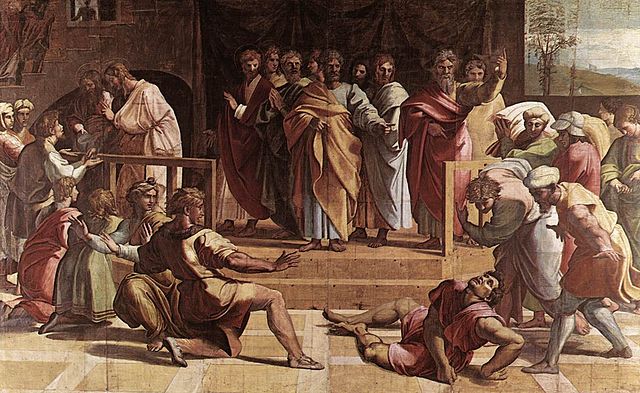
The Death of Ananias (1515), by Raphael (1483-1520) [public domain / Wikimedia Commons]
* * *
[Eric Svendsen’s words will be in blue; another anonymous Protestant’s in green]
***
***
- *
- But what of, say, contraception? Luther and Calvin thought it murder, and all Christians opposed it until 1930, but now it is a perfectly moral “choice” in the opinion of the vast majority of Protestant sects. Thus, “orthodoxy” changed, and on the flimsiest of grounds (faddism and moral compromise).
What year did contraception become a sin, Dave?
- *
- At this point, I’d accept any interpretation. Again, I reiterate: at least Luther and Calvin had the strength of their convictions to excommunicate other Protestants for dissidence, because they truly believed in their own brand of Christianity. There is something to be said for that.
So now, Dave, you would like us to have the courage of conviction to anathematize our brothers who disagree with us on all points of dogma. And once we do that, we will have earned your respect and praise for acting upon our conviction?!
Is Protestantism thus reduced to an Orwellian “some doctrines are more true than others”? Besides, you can disagree but still be brothers in Christ. I’m doing that in this group. My Church does it officially with regard both to the Orthodox and Protestantism. The two aren’t mutually exclusive, you know.
Guess again. I say it is primarily referring to love, but also secondarily to doctrine, because Scripture doesn’t separate the two, but holds them in unity (no pun intended).
No Dave, I am not going to anathematize a brother in Christ for believing wrongly on the issue of baptism or the Lord’s Supper. I will certainly disagree with him, and point out his error.
Maybe we’re not that far apart after all, then. But you miss the fact that I was asking for James White’s answer as to what the apostles believed on my 18 points. The original context of my challenge was for James to define his own terms. His reluctance (and everyones’) is heartening to me at least to the extent that Protestants are squeamish about their own disunity, chaos, and relativism, as evidenced by the fear of dealing with it straight-on in answering a friendly Catholic critic.
One tries to avoid dilemmas that might possibly be fatal to one’s position. Understandable. But I will not cease my probing, especially as long as you guys accuse or misunderstand my Church. What’s good for the goose is good for the gander.
It occurs to me that it is exceedingly strange for Protestants to relegate the Eucharist to relativism and relative insignificance, when our Lord (yes, ours, despite John MacArthur’s insistence that I worship a different one) made it a point of division Himself. John 6:66 tells us of “many of his disciples” forsaking Him. Now, if the Eucharist were just minutiae on the grand scale of matters theological, why didn’t Jesus beg and plead with these people to stay?
If your view is correct, it seems reasonable that Jesus should then have said, “Hey, don’t go: this isn’t a matter which should divide us — we agree that I am God. Who cares about what happens in the central act of Christian worship!” And we know also that Jesus said “unless you eat the flesh of the Son of Man and drink his blood, you have no life in you” (Jn 6:53). But that’s “secondary,” “non-essential”? I’m sorry, but I can’t give my assent to such an incoherent and unbiblical viewpoint. Call me obtuse if you like.
And of course, Scripture intimately relates baptism with both repentance and salvation (for the latter, see e.g., Acts 2:38, 1 Pet 3:21, Mk 16:16, Rom 6:3-4, Acts 22:16, 1 Cor 6:11, Titus 3:5). But no matter, “us Protestants value a false, pick-and-choose unity rather than biblical truth.” Or so it seems to this observer, one who has lived a committed Christian life in both worlds. Now I will give you a multiple choice test. Please mark an “x” in the appropriate boxes (Protestants can have more than one right answer, Catholics only one):
YOU…..BIBLE …..APOSTLES…….CHURCH HISTORY
Belief in the Eucharist
Belief in infant, regenerative baptismNow, for your homework tonight, I’m asking you to explain why (if you differ from either the Bible, the apostles, or the vast majority of Christians for 2000 years), your belief diverges from that of the others. In 500 words or less. Thank you. Protestants will be graded on a scale, so that most of them will get an “A” no matter what their answers are . . .NOTE: I want all of you Protestants out there to take this test, not just Eric. You’ve ignored my questions long enough, and it is getting downright rude! [none answered]
*
What do you call Lutherans or Calvinists drowning and torturing Anabaptists – a quibble among family? How do you view the multitude of capital offenses for heresy in Protestant countries in the 16th and 17th centuries (is that “coercion”?). What about the thousands of “witches” who were put to death by Protestants (the Spanish Inquisition having condemned witch hunts as mass delusion)? Need I offer any more examples? But the wicked Catholic Church and its anathemas . . .
How do we regard Protestants now (however one regards our views in days past when men still cared enough for religion to fight over it)? And how do many of you regard us (e.g., James White and Phillip Johnson, and you)? A bit hypocritical of you, wouldn’t you say, Eric? You ought to spread your moral outrage around a little more – shall we say indiscriminately.
- Thus, you guys went from one extreme to the other: baptism once meant everything; now it means virtually nothing.
Gee, I wonder if the Catholic “old man” has its share of these? Let’s see, at one time Catholics were killing and condemning to hell all Protestants who opposed Rome’s authority, denying them salvation. Now, suddenly, we are “means of salvation.”
- *
- (how could it, since you are divided into five camps?). So your sinful divisions lead to compromise on doctrine.
Who has compromised doctrine? Not I.
Good, then please give me your list of my 18 points, since you’re a good, “uncompromised” Protestant. That will be a wonderful start for the man on the street to ascertain apostolic and Christian truth. Real progress . . .
We’re working on that. Rome wasn’t built in a day. :-)
– then, indeed, I would be compromising doctrine.
Certainly no more than you and yours are now! It’ll be a giant step up!
There certainly is virtue in unity of belief.
Now that is a true statement, provided the beliefs are true, of course.
Try as you may, neither you nor any Protestant can overcome the strength and validity of this objection to your position. That’s why I asked someone “what would convince you that your view is wrong: 240,000 sects?” (rather than 24,000). What does it take? How absurd and chaotic must things become before you start to question your first principles? As the old pop song goes, “There, I’ve said it again.”
I respectfully disagree. This is one where we will have to just agree to disagree. You guys don’t think my “perspicuity” argument applies to you, and us Catholics return the favor when you say liberals in our ranks cast doubt on our general position on authority/Tradition, etc. So what can you do? I’ve seen nothing to cause me to change my mind on this particular point thus far.
*
I stated that if one had a Bible on a desert isle, and that’s all he had, sure, he could be saved. But I also said that some Church or authority will be ordinarily necessary, so that, in the final analysis it is a moot point. I believe that all Catholic doctrines can be found in Scripture, either explicitly or implicitly or indirectly. If that is material sufficiency, then I am in that camp.
But if it means that somehow the Church and Tradition are thereby taken out of the picture as not intrinsically necessary to Christianity, then I must dissent, because I don’t see that in Scripture (I believe sola Scriptura is self-defeating, in other words). Catholics regard Scripture as central, but not exclusive, with regard to authority and Tradition. Thus, to critique sola Scriptura does not at all imply a lessening of respect for the Bible, as has been implied in this group and elsewhere.
All in all, personally I see this “partim-partim” debate as boring and irrelevant (that’s not to say that others can legitimately think differently). I think we need to determine what Tradition(s) were in fact believed by Christians through history, and whether these can be found to possess a scriptural basis, and I consider Church history as evidence of God’s hand, working to sustain and protect His Church (however that is defined) from error.
I approach these things (i.e., the sola Scriptura / tradition debate) from an historical and pragmatic perspective (and of course, biblically, as do we all), rather than more philosophically. I’m all for philosophy, but since the nature of authority is a very practical matter, I think it is better to stick to a pragmatic method in this case.
- Now when James White says that Arminians are not true Protestants (and hence, by deduction from his own premises, not true Christians, either), who am I (or any inquirer) to believe, and why? What “Catechism” or “papal figure” would I appeal to in that case?
Karl Keating.
- The obvious retort is: of what use is “one” written “tradition” when it produces doctrinal chaos? What is gained by that? It’s as if you have one ruler, but everyone has different systems of measuring with it!
But, ironically, you have succinctly and, no doubt, inadvertently described the Roman system in your very last sentence. Admittedly then, the Roman system has just as much chaos as does Protestantism (but this theme is perhaps more appropriately covered further down the road).
On the other hand, there is no identifiable Protestant “position” other than C. S. Lewis’s “Mere Christianity,” which takes in Catholic and Orthodox theology anyhow, and so is not even distinctively Protestant. About all that “orthodox” evangelical Protestants agree on is sola Scriptura and an agreement that Catholicism must be wrong (and even a strict sola Scriptura view is questionable among Anglicans and many Lutherans).
*
According to which tradition: the Lutheran, Episcopalian, Methodist, Presbyterian, Reformed, Anabaptist, Church of Christ, independent pentecostal, non-denom, Baptist, Church of God, Mennonite, Quaker, United Church of Christ, Disciples of Christ, Assembly of God, Copelandites, self-described “Bible Christian,” or some other group of your choice, from among the multiple thousands, or simply your own “biblical” view?
*
Do you positively assert that such a scenario is a priori impossible? If not, what would constitute adequate proof for you?
I teach communication skills to corporations for a living. One of the exercises I love to do to illustrate the ineffectiveness of a message that has gone through many hands is this: I whisper a sentence to one of the participants in the seminar, and then have that person whisper the same message to the person next to him, and that person in turn whispers the same message to the next person, and so on until the message has made its way around the room (approx. 30 people). Then I have the last person to receive the message stand and recite it – invariably to the roaring laughter of the rest of the class who cannot believe how much the sentence has changed in the process! (try it sometime). The simple fact is, we will botch up the message every time. That, my friends, is why God chose to commit the essential teachings to writing in the first place.
Yes, I’ve heard this. But using it to shore up sola Scriptura is a classic example of the fallacy behind Protestant presuppositional objections to Tradition: they assume that (Catholic) Tradition is merely human, and therefore subject to all the foibles of that weak vessel, whereas we assert that it is guided by the Holy Spirit and hand of God, in order to preserve it from error (by means of the Magisterium of the Catholic Church).
You assert that God could produce an infallible Bible by means of fallible, sinful (mostly Jewish) men (such as David, Matthew, Peter & Paul), and confirmed in its parameters also by fallible, sinful (Jewish and Catholic) men, and translated by fallible, sinful (mostly Catholic) men, and preserved for 1500 years before Protestantism was born by fallible, sinful (mostly Catholic and therefore apostate, according to James White) men, too. We contend that God can and does likewise create and sustain an infallible Church and Tradition, which is not a whit less credible or plausible.
As I’ve stated many times, we are discussing Christianity (which requires faith and a belief in the supernatural, God’s Providence, etc.), not epistemological philosophy. Ours is a faith position, but no more than yours (I would say less so). James argues like an atheist when he tries to pretend that our view is largely irrational blind “faith in Rome,” whereas Protestantism is altogether scriptural, reasonable, and not requiring faith in any institution outside one’s own radically individualistic, subjective, existential “certainty” (perhaps also, in his case, Calvin).
One must examine premises, and their relative merits. That’s why I like to dwell on the foundations of belief-systems, knowing that if they are found weak and crumbling, the superstructure resting upon them will necessarily collapse. The two pillars of Protestantism are sola Scriptura and sola fide. Like Samson, I pushed the two pillars down, and the house of Protestantism collapsed upon my head, killing me as a Protestant, but luckily, a coherent Christian alternative existed, so I was resurrected. :-)
*****













